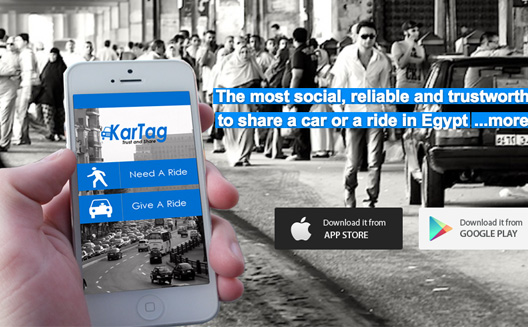KarTag enters the Cairo carpooling market with a user-generated 'pure carpooling' model


Egypt suffers from an astonishing amount of automobile-related pollution, traffic, and parking problems. Egyptian entrepreneurs have been innovating their way out of the traffic problem for a while now, and Hayk Hakobyan is joining their ranks. His scheme is different, though, in that it uses sharing to solve one of Egypt's most complicated problems.
Hakobyan is one of three cofounders of KarTag, a newly launched social carpooling mobile app available for iOS and Android devices. Through the app, users can offer rides to their Facebook community in their own cars, setting the price and itinerary themselves with no interference from KarTag, says Hakobyan. “Our app facilitates matchmaking between those who have a car with those who need a ride. This is all being done among Facebook friends, friends of friends, and colleagues / students from the same company, university, or area,” he says.
“We believe that everyone should have access to affordable and reliable transport, and that being on the road can still be cheap, green, and fun,” Hakobyan adds, explaining KarTag’s mission.
Hakobyan is an Armenian national. Years ago, he moved to Switzerland to study nuclear physics, but has lived in Egypt for the last four years, working on tech-related initiatives.
Launched in May 2013, KarTag joins a long list of carpooling apps in the Middle East region in general, and Egypt in particular. Services such as Waselny in Jordan, and Egypt Carpoolers and NerkabSawa (among many others) in Egypt, have been struggling to persuade users to adopt the concept of carpooling. With a different take on social carpooling, KarTag aims to bridge the culturally driven tendency to mistrust such services.
“The concept of the sharing economy is relatively new [to the region], and while Arab people have always shared things and services with each other inside their cultures, the technology that allows and facilitates this [new] sort of sharing is still new in this region,” Hakobyan.
KarTag is still trying to reach to potential customers, although the app has been downloaded 1,000 times on Google Play since its launch last May, and slightly less than 1,000 times on the App Store. Hakobyan tells Wamda they are currently forging partnerships with universities (Heliopolis University is on board at press time), multinational corporations and organizations, as well as with other apps related to transportation and traffic such as sharemyfare.com in Turkey, and Wasalny in Egypt.
KarTag will need to deal with another well-established competitor, PieRide, a company that also allows people traveling to and from the same area (university students, work colleagues, etc.) to share a car or bus driven by a professional driver. Hakobyan seems quite sure his venture is different: "While KarTag is a social, community-based carpooling service, PieRide is more a mixture of a subscription-based taxi and carsharing." He's careful to mention, though, that their overally missions are the same: "However different, both startups aim to alleviate increasing traffic levels in Cairo."
Evading the standard business model of carpooling services, KarTag is free to use for users, “We generate revenues by offering white label versions of our app to big companies, MNCs, organizations,” Hakobyan elaborates their business model. “Our charges are based on their size, number of employees, and modification of the app they would like to have.”
KarTag’s team plans to expand the service in the near future, to include “other value-added services in the coming version.” They are also looking to expand geographically, first in the MENA region, and then Asian, African, and Eastern European markets. “We’ve had feedback that this specific type of carpooling app – which actually solves the trust issues through Facebook – needs to be deployed in Asian countries, such as Indonesia and Malaysia, as well as former Soviet republics,” Hakobyan says.
English Managing Editor Stephanie d'Arc Taylor contributed to this report.


